Rowboat in a Hurricane (19 page)
It seems ironic that the goals that appear so intimidating, complex, and glorious are often composed of simple, mundane activities. Pulling on oars in the ocean is not difficult in itself; the challenge is to stay steadfast and committed in the face of adversity. I thought again of what John Ridgway had said:
It’s all up here.
That’s true for most objectives in life. It’s not talent that ensures success, but commitment and perseverance.
Easy enough to say, but our levels of perseverance were running low. After a frustrating eight hours of rowing nowhere, we finally gave up. Colin cut his rowing shift short and instead we trailed a rope and chain to slow our drift. We both settled into the cabin and drifted backwards, slowly losing the hard-won progress gained earlier in the day. Colin called Dean Fenwick, our coordinator, on the satellite phone for the latest weather forecast, and the news was good. In twenty-four hours the winds were forecast to switch around to the northeast, and they would be in our favour.
But the headwinds would not let up until two days later, so we spent little time rowing. Instead we lay in the cabin, and Colin worked on his book
Beyond the Horizon
while I read Farley Mowat’s
A Whale for the Killing.
Mowat has long been one of my favourite authors, and this book is especially compelling, a true story of the sad fate of a pilot whale that became stranded in a tiny bay in Newfoundland. The whale pursued a school of fish through the shallow entrance of the bay during an exceptionally high tide, but once the tide ebbed, the creature’s exit disappeared. The gentle giant became a source of unwanted attention from the local villagers, who chased the whale in speedboats and used it for rifle target practice. Pocked with countless bullet holes and wounded by a boat propeller, it eventually died from its infected injuries. That was in
1967
, and thankfully societal views towards whales have improved since then.
Many whale populations have rebounded since the moratorium on commercial whaling; some, such as the grey whale, have returned from the verge of extinction. The pilot whale, once hunted ferociously, is now one of the most abundant and widespread cetaceans. So far we had spotted what we thought were two pilot whales, but sadly neither had come very close to our boat.
“TRICK OR TREAT.
Our fortieth day at sea is Halloween, and we’ve been treated to northeast winds at force four! We’re moving at
1
.
8
to
2
.
5
knots, and our spirits are high,” I wrote in my journal.
It was a wonderful change, and these conditions were forecast to persist all week. It finally looked like we would make some decent progress. Perhaps this was the start of the famous trade winds.
“I’m afraid I forgot to pack our Halloween costumes,” I joked.
“You can dress up as a mermaid and I’ll be a pirate,” Colin said.
“You already look like a pirate,” I said.
All Colin needed was an eye patch. His hair had not been cut since he’d left Vancouver seventeen months before. It now reached his shoulders, a far cry from his usual crew cut, while his bushy beard enveloped the lower half of his face. Had I not seen the transformation in slow motion, I might have had difficulty recognizing him.
I, however, looked no different. My hair was a little more knotted and my face sunburned, but that was about it.
“Well, if we do get any visitors . . . I know one treat we could offer,” Colin said pointing to the lure on our fishing rod.
“That would be a
trick.
”
“That depends on your perspective,” said Colin.
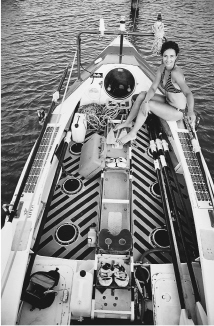
The deck of the rowboat, showing the two rowing seats, circular hatches, and bow storage compartment.
PHOTO: COLIN ANGUS
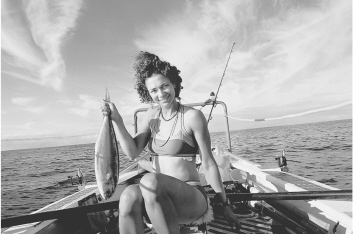
Showing off a dorado caught mid-Atlantic.
PHOTO: COLIN ANGUS
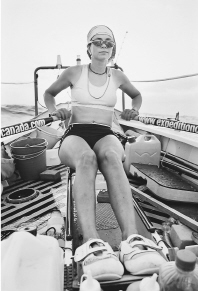
A typical day rowing on the ocean.
PHOTO: COLIN ANGUS
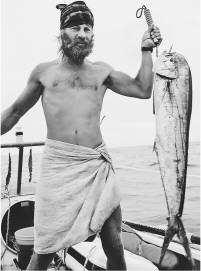
A larger-than-usual dorado we caught that provided several meals.
PHOTO: JULIE ANGUS
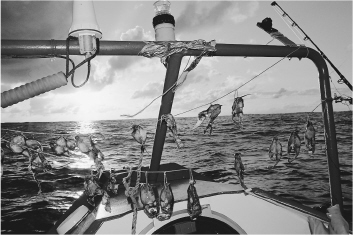
Sun-drying dorado fish that we caught mid-Atlantic—delicious in soup.
PHOTO: JULIE ANGUS
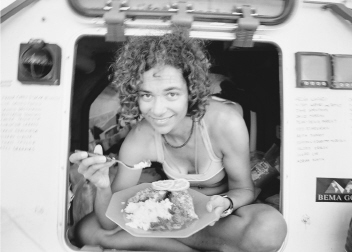
Eating a special dinner of dorado, rice, and vegetables on the rowboat.
PHOTO: COLIN ANGUS
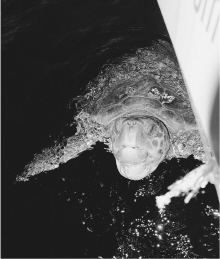
A loggerhead turtle that took a keen interest in our boat and in the barnacles growing on our hull.
PHOTO: JULIE ANGUS
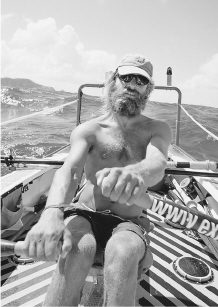
Colin rowing towards St. Lucia, after being on the ocean for four months.
PHOTO: JULIE ANGUS
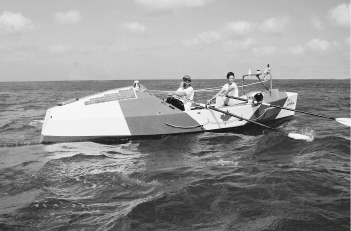
Rowing near St. Lucia in the Caribbean, after travelling more than seven thousand kilometres from Portugal.
PHOTO: KIRK ELLIOT